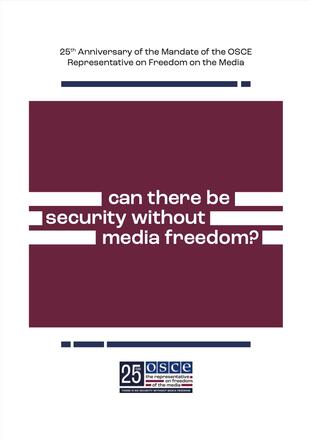
The media landscape underwent a significant change with the introduction of new technologies and the pervasive role of social media in people’s lives. The use of online platforms has increased news consumption, but they have also posed significant challenges for the media, including economic pressure as well as spread of propaganda and disinformation. Recent events like Russia's invasion of Ukraine drew more attention to questions related to the restriction of press freedom. The lack of accountability of online platforms translates into challenges to the rule of law which does not operate in the digital realm, given that the judiciary has no resources to intervene in all content moderation and online freedom of expression issues. Similarly, the weaponization of free speech, and the erosion of trust, to name a few, are some of the major changes that have a negative impact on media freedom and therefore, on people’s common security. Self-regulation of companies and government regulation must be used jointly to address these issues while guarding against government abuse. Press freedom is crucial for spreading accurate information, holding authorities accountable, promoting inclusive and peaceful societies, and guaranteeing common security.
Technological changes in the media landscape have also impacted the understanding of “media freedom”. The horizontality of social media has allowed anyone to broadcast content without passing through an editorial control body. Bloggers, vloggers, influencers, and commentators coexist with traditional journalism today, challenging the definition and function of media. Decentralised information exchanges are now possible thanks to new media platforms and technologies, but they also increase the risk of false information spreading. Therefore, the work of journalists is becoming more and more multifaceted; in fact, a substantial amount of time has to be dedicated to fact-checking and disputing untruths. Dominant online platforms have a significant impact on media freedom, an influence raising concerns regarding the tendency of AI-driven content focused on internal and advertisers’ economic interests rather than diversity, accuracy or the public good. Local journalism and public service media are threatened by financial and editorial constraints that might lead to less public scrutiny and to a lack of local news businesses. In this regard, it is necessary to deal with the phenomenon called “News deserts”, which are areas of Europe where local news media outlets went out of business.
To address these issues, the OSCE gives some recommendations. The following suggestions are to be implemented all together in order to strengthen freedom of the media, human rights, democracy, and therefore, security in the years to come:
1. Creating Networks:
Bridging the gap between government, academia, and civil society, to achieve effective multilateral solutions to various media freedom challenges.
2. Public Interest Framework:
Creating a framework for the general welfare to combat misinformation and guarantee access to reliable information; this may include strategies for identifying and prioritising media content that serves the public interest.
3. Safety of Journalists:
Urging the authorities across the OSCE region to offer clear and open political support for journalism and journalists’ safety, as a means to build back public trust in independent media and trust in democracy.
4. Supporting journalists in Exile:
Providing state officials with direction and support, so they can help exiled journalists operate effectively in their new jurisdictions.
5. Economic Sustainability:
Supporting the financial viability of independent media through new public funding, while respecting the editorial independence of public service media.
6. Media, Information, and Digital Literacy:
Helping people successfully navigate the information environment, encouraging media and information literacy.
7. Representation Matters:
Addressing the under-representation of certain groups, stopping online abuse of female journalists and others who are targeted for their inherent or assumed characteristics.
8. Media Self-Regulation:
For the sake of preserving credibility, safeguarding independence, and preventing harmful content, we support media self-regulation.
9. Platform Governance:
Participating in global platform governance discussions and addressing questions related to the authority and rules of online platforms.
10. Impact of Artificial intelligence on Freedom of Expression:
Advocating for social media companies to be transparent while promoting the responsible use of AI in content governance
11. Combating Disinformation and Propaganda:
Promoting truth-checking and high-quality journalism in the fight against misinformation.
12. Capacity Building for Judiciary:
Enhancing the judiciaries' ability to defend the right to free speech.
13. Privacy and surveillance:
Preventing the misuse of certain technologies in silencing journalists and creation of regulatory frameworks to prevent manipulation online and violations of data protection.
The following years, a structured dialogue with all the stakeholders is needed. The effort in safeguarding media freedom is a necessary step toward guaranteeing peace and security.
Tags: OSCE Member States Freedom of expression Media freedomThe content of this article can be used according to the terms of Creative Commons: Attribution-NonCommercial 4.0 International (CC BY-NC 4.0) . To do so use the the wording "this article was originally published on the Resource Centre on Media Freedom in Europe" including a direct active link to the original article page.

